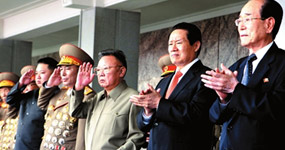
奥巴马(Barack Obama)本月早些时候访问亚洲时,在各个国家都受到了礼遇。这引起了一位中国官员多少有些凄艾的反应。他说:"环顾世界,美国有数十个关系稳固的盟国。而我们只有一个。"
而这个盟国却令人尴尬不已。过去几天,中国政府又一次因为与朝鲜及该国独裁政府的密切关系而陷入难堪,而朝鲜政权正是凭借中国的援助和政治保护才得以存续下来。
朝鲜周二炮击一座韩国岛屿,以及平壤似乎已开发出一座先进的铀浓缩设施的消息,引发了各国政府的强烈呼声——那就是中国必须对朝鲜施加更大压力。
平壤方面的每次挑衅,似乎只会强化人们心目中北京无能为力的印象。朝鲜的独特之处在于:它是唯一一个能够不时令中国难堪,却不会受到任何责难的国家。
中国对朝政策让许多人感到不快,因此在国内不受欢迎也就不足为奇——在普通大众和精英阶层皆是如此。周三,即使是较为保守的博客,对平壤的最新举动也充满了鄙视之词。在关注军事话题的铁血网上,一位评论者表示:"你怎么还能继续包容这种亡命之徒呢?"
在另一家网站上,一个帖子写道:"这一次,我希望朝鲜不要指望中国再去救它。这只家门口的疯狗,为什么就不能让我们安静一会儿呢?"
与此同时,中国外交政策专家几乎是一个接一个地指出,与朝鲜走得太近可能带来的所有问题。他们表示,中朝同盟破坏了中国塑造负责任全球公民形象的努力,而且在明年1月份胡锦涛主席访美之前,会加大缓和中美关系的难度。
中朝同盟使得中韩之间心存芥蒂,尽管两国有着紧密的经济联系。同时,对于日本社会中推崇加强军力建设、甚至发展自身核武器的论调,朝鲜的举动也起到了推波助澜的作用。
北京外国语大学(BFSU)的谢韬表示:"如果我们不能确保朝鲜的行为可以预测,那么这种同盟就得不偿失。"
然而,尽管存在上述种种担忧,中国政府的主导观点似乎依然没变:即朝鲜政权如倒台,会导致大量难民逃往中国,带来不安定因素;而独立的朝鲜能够在中国与驻韩美军之间提供一个缓冲地带。
中国政府官员坚称,他们对这个邻邦的经济前景感到乐观。
朝鲜领导人金正日(Kim Jong-il)今年两次访问中国东北,参观了亮丽的现代都市。此后,北京方面坚持认为,这一次朝鲜真的是在认真考虑实施中国式的改革。
看起来,中国政府并不打算改变自身立场,而是试图以巧计应付当前的局势。与今年夏季不同,此次中国没有公开反对美韩联合军事演习,以免进一步惹恼韩国。但迄今为止,北京方面一直回避公开谴责平壤的进攻行为,且没有迹象表明,中国会采取类似2006年平壤核试验之后所实施的燃料出口限制手段。
如果平壤再次进行类似的核试验,中国反思对朝政策的压力将再度抬头。不过,就目前而言,北京方面已经决定支持金正日让其子接班的计划。
在上月平壤举行的一次阅兵式上,金正恩(Kim Jong-eun)在全国亮相,而中共最高级别官员之一周永康当时也站在主席台上,笑容满面。无论朝鲜是不是一个令人尴尬的盟友,北京方面显然已决定与金氏家族共命运。
译者/何黎
http://www.ftchinese.com/story/001035733

As Barack Obama was visiting Asia earlier this month, his friendly reception in country after country provoked a somewhat forlorn response from one Chinese official. "Look around the world. The US has dozens of well-established alliances," he said. "We only have one."
And what an awkward alliance it is. Over the last few days Beijing has once again been put on the spot about the close ties with North Korea and its dictatorship, kept afloat by Chinese aid and political protection.
The shelling on Tuesday of a South Korean island and news that Pyongyang appears to have developed a sophisticated uranium enrichment facility have provoked a loud call from world capitals – China must put more pressure on North Korea.
Each new Pyongyang provocation only seems to underline the perception of Beijing's impotence. North Korea really is a unique place: it is the one country that is able to routinely embarrass China and not suffer any rebuke.
Given the sense of discomfort in many quarters, it is perhaps no surprise that China's North Korea policy is unpopular at home – both among the general public and at elite levels. Even fairly conservative blogs were full of scorn on Wednesday for Pyongyang's latest moves. "How can you still accommodate this kind of desperado?" said one commenter on Tiexue, a website that focuses on military issues.
On another website a contributor wrote: "This time I hope North Korea won't expect China to save her again. This mad dog at the gate, why can't it give us a moment of peace?"
Meanwhile, Chinese foreign policy scholars were almost queuing up to point out all the problems that come with close ties to North Korea. The alliance has damaged China's efforts to present itself as a responsible global citizen, they claim, and will make it harder to smooth relations with the US ahead of January's visit to Washington by Hu Jintao, president.
It is driving a wedge between China and South Korea, despite the close economic ties between the two countries. North Korea's actions also provide encouragement to those parts of Japanese society pushing for a stronger military build-up or even their own nuclear weapon.
Xie Tao at Beijing Foreign Studies University says: "If we cannot ensure predictable behaviour by North Korea, then the alliance is not worth it."
Yet, for all the angst, the dominant view in Beijing still seems to be that a collapse in the regime would unleash a dangerous wave of refugees into China, while an independent North Korea provides a buffer between China and US forces in the South.
Chinese officials insist they are upbeat about the prospects for their neighbour's economy.
After Kim Jong-il, the North Korean leader, made two visits this year to shiny, modern cities in north-eastern China, Beijing insists that this time North Korea really is serious about adopting China-style reforms.
Rather than reconsider its stance, it looks as if Beijing will try to finesse the immediate situation. Unlike this summer, China has not objected loudly to planned military exercises between the US and South Korea, for fear that this might further anger Seoul. But Beijing has so far avoided open condemnation of Pyongyang's aggression and there are no signs of the sort of restrictions on fuel exports that Beijing imposed after Pyongyang's 2006 nuclear test.
If Pyongyang were to launch another such test, the pressure for a rethink would mount again in China. But, for the time being, Beijing has decided to underwrite Mr Kim's plan to hand power to his son.
When Kim Jong-eun was presented to the nation at a military parade in Pyongyang last month, standing on the podium was a beaming Zhou Yongkang, one of the Chinese Communist party's most senior officials. Awkward ally or not, Beijing has clearly thrown in its lot with the Kim dynasty.
没有评论:
发表评论